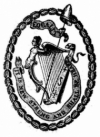Ireland
 British military and political intervention in Ireland goes back as far as the 12th century.
British military and political intervention in Ireland goes back as far as the 12th century.
Following the unsuccessful rising of the United Irishmen in 1798, the Act of Union in 1800 formally made Ireland part of the UK and the Irish parliament was abolished. Eighty Irish MPs now sat at Westminster. There were unsuccessful attempts in 1803, 1848 and 1867 to overthrow British rule and establish a Republic.
The failure of armed rebellion led to the resurgence of constitutional campaigning in the last quarter of the 19th century. The Irish Nationalist Party sitting in the House of Commons sought a Home Rule Bill which would give Ireland back its parliament but have it remain within the United Kingdom. This was opposed by Irish Protestants, particularly in the province of Ulster, fearful of a Catholic majority state. At the same time there was agitation in the countryside over the rights of tenants to secure tenancies led by the Land League. A Home Rule Bill was passed in 1912 but suspended at the outbreak of war.
The Easter Rising in 1916 failed but led to Sinn Fein replacing the Irish Nationalists as the majority political force, winning a majority in the general election in 1918. They refused to take their seats at Westminster and set up the Dail in Dublin. The British government refused to recognise the result, leading to the War of Independence between the IRA and British forces.
The war ended with the treaty of 1921 which established the Irish Free State in 26 counties. The other six counties in Ulster became Northern Ireland, cementing Unionist rule.
The Catholic minority in Northern Ireland was subject to extensive discrimination resulting in the formation of the Civil Rights movement in the late 1960s. British troops went onto the streets in 1969 following rioting. They soon came into conflict with the IRA.
A political settlement was finally reached in 1998 resulting in power sharing between Unionist and Nationalist parties.
The library’s extensive Irish collection is derived from the libraries of two historians and political activists: T A Jackson and C Desmond Greaves. It begins in the late 18th century and covers all the principal events and movements noted above, trade unionism and women’s suffrage movement. It also covers the conflict in Northern Ireland 1969-1997. The collection comprises books, pamphlets, archives, leaflets, posters, newspapers, magazines, photos, LPs and prints. Click here to arrange a visit to the Working Class Movement Library


 Thomas Paine publishes 'Rights of man'
Thomas Paine publishes 'Rights of man' Irish Rebellion
Irish Rebellion Peterloo
Peterloo Tolpuddle
Tolpuddle Rochdale Pioneers
Rochdale Pioneers Kennington Common Chartist meeting
Kennington Common Chartist meeting 'Manchester Martyrs' executed
'Manchester Martyrs' executed
 Fall of the Paris Commune
Fall of the Paris Commune Foundation of the Independent Labour Party
Foundation of the Independent Labour Party



 General Strike
General Strike
 Kinder Scout mass trespass
Kinder Scout mass trespass Spanish Civil War
Spanish Civil War
 Nationalisation of the coal industry
Nationalisation of the coal industry Birth of the NHS
Birth of the NHS Hungarian uprising
Hungarian uprising Aldermaston marches and birth of CND
Aldermaston marches and birth of CND Prague Spring
Prague Spring
 Grunwick dispute
Grunwick dispute
 Miners' strike
Miners' strike Nelson Mandela's release from prison
Nelson Mandela's release from prison
 Introduction of national minimum wage
Introduction of national minimum wage

